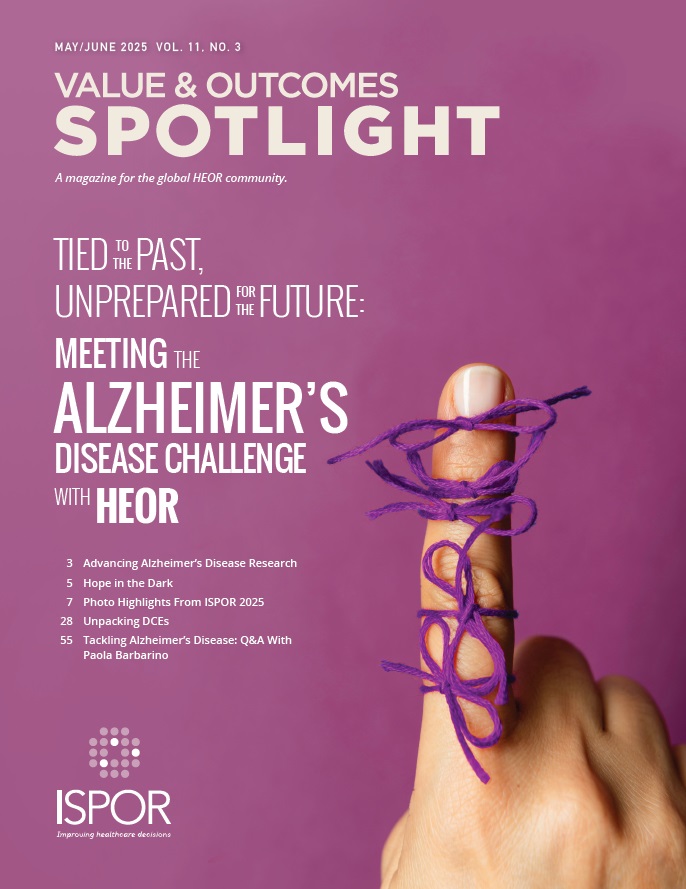Hope in the Dark: HEOR’s Value in Alzheimer’s Disease Research and Treatment
Rob Abbott, CEO & Executive Director, ISPOR
 To suggest that Alzheimer’s disease (AD) is an insidious affliction is to perfect the art of understatement; it erodes—and ultimately destroys—patients’ memories and robs family and friends of loved ones long before death. Nearly 3 decades on, I still get chills thinking of the day my father no longer recognized his wife of nearly 50 years. Such is the emotional and psychic impact of AD. It is also a truly global health issue—the seventh leading cause of death worldwide—with nearly 90 million people living with “early AD” and at least another 30 million coping with mild, moderate, or severe forms of the disease. Worse, the global prevalence of dementia, of which AD accounts for 60% to 80%, is predicted to triple by 2050 due largely to an aging population. In the United States, 1 in 9 Americans aged 65 and older has AD and by 2030, 20% of the US population is expected to be age 65 years or older, so the number of Americans suffering from this fatal form of dementia could increase significantly.
To suggest that Alzheimer’s disease (AD) is an insidious affliction is to perfect the art of understatement; it erodes—and ultimately destroys—patients’ memories and robs family and friends of loved ones long before death. Nearly 3 decades on, I still get chills thinking of the day my father no longer recognized his wife of nearly 50 years. Such is the emotional and psychic impact of AD. It is also a truly global health issue—the seventh leading cause of death worldwide—with nearly 90 million people living with “early AD” and at least another 30 million coping with mild, moderate, or severe forms of the disease. Worse, the global prevalence of dementia, of which AD accounts for 60% to 80%, is predicted to triple by 2050 due largely to an aging population. In the United States, 1 in 9 Americans aged 65 and older has AD and by 2030, 20% of the US population is expected to be age 65 years or older, so the number of Americans suffering from this fatal form of dementia could increase significantly.
Against this backdrop, I welcome the editorial focus of Value and Outcomes Spotlight on health economics and outcomes research (HEOR) and its contribution to research and treatment of AD. I’m especially interested in the contributions the papers in this issue make regarding the demonstration of value in AD research and treatment. This, of course, means that the patient and caregiver perspective is vital in helping to grow our collective understanding of how patients and their caregivers think about value.
AD is characterized by the accumulation of toxic amyloid-beta plaques, tau tangles and neuroinflammation in the brain, which causes irreversible neuronal loss and a progressive decline in cognitive function. Ultimately, AD interferes with a person’s ability to perform everyday tasks unassisted. In late-stage AD, it is not uncommon for a patient to become confused, unable to communicate, and completely dependent on others for care.
One of the most challenging—and frightening—aspects of AD is that symptoms can begin having an impact on people well before a formal diagnosis is ever made. In some cases, decades before. The most common expression of this might be memory loss, which can be incorrectly attributed to normal aging. Sadly, by the time many people with AD see a physician, they already have mild cognitive impairment. For those people unfortunate enough to be diagnosed with mild cognitive impairment due to AD, progression to dementia is inevitable.[i]
"One of the most challenging—and frightening—aspects of AD is that symptoms can begin having an impact on people well before a formal diagnosis is ever made. In some cases, decades before."
Historically, treatment protocols for AD were modest; symptomatic treatments with temporary benefits were the norm, and there was no material impact on long-term health outcomes. More recently, scientific progress has seen the onset of disease-modifying treatments that target AD progression. The accelerated approval of lecanemab by the US Food and Drug Administration is an example[ii]—this anti-amyloid immunotherapy has been shown to slow cognitive decline in people with mild cognitive impairment and mild AD-related dementia. This, in turn, creates the potential for people with AD to enjoy a higher quality of life for longer, and equally, to relieve some of the burden from care partners and the healthcare system more broadly.
I would be remiss if I didn’t mention ISPOR’s deep interest and activity in advancing the science of AD research and treatment. Earlier this year, Value in Health, the official journal of the Society, published a special themed section of research papers that offer crucial insights into the complex health economics of AD and related dementias. Collectively, the papers offer a roadmap for future research, policy development, and treatment as the global population ages and novel treatments emerge.
This issue of Value & Outcomes Spotlight is a beautiful complement to the works published earlier in Value in Health. They help us continue the journey to understanding both the trajectory and time horizon for AD as well as the economic implications of the disease—this is particularly important given that the health impacts and costs can be spread over decades. At the same time, the challenges of AD open up new vistas of possibility from a research and methods development perspective. How might we, as ISPOR, think differently about the definition of value in the context of a chronic disease like AD? What new methods might we, as the professional society for HEOR, advance to improve on cost-effectiveness measurement for AD? These are just some of the questions that lie beneath the surface.
"As the CEO of ISPOR, one of the things—maybe even the thing—that excites me most is the opportunity to champion research and the translation of that research into HEOR insights that shapes new and better policy decisions."
As the CEO of ISPOR, one of the things—maybe even the thing—that excites me most is the opportunity to champion research and the translation of that research into HEOR insights that shapes new and better policy decisions. This, in turn, should lead to better outcomes for patients. In the case of diseases like AD there are so many opportunities for ISPOR to make a difference: standardizing economic evaluation methods, articulating more rigorous approaches to the measurement of economic impact(s), and ensuring equity in access to new treatments, to name a few. There are also imperatives to consider how we might use artificial intelligence algorithms to accelerate diagnosis and treatment. The focus on this topic by both Value in Health and Value & Outcomes Spotlight galvanize my resolve to keep pushing forward and catalyze my thinking about where and how to push for maximum effect. The journey is really just beginning but there are signs of progress and clues to where we should place our feet next. All that is needed is the will to keep going. On behalf of patients with AD and their families and caregivers, and healthcare systems globally, I pledge to keep going.
[i] And the impact of AD is not limited to the patient; the burden of care on partners and other family members is considerable—and greater than for most other chronic diseases. It is clear, for instance, that work productivity, emotional health, and the overall quality of life of care partners and family members of people with AD are compromised relative to the rest of the population.
[ii] FDA approval in 2021 of aducanumab, a therapy targeting the fundamental pathophysiology of AD, is another, although not without controversy given its treatment cost.

